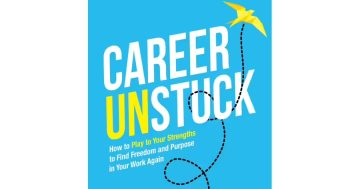Ashley Stahl* suggests four career paths for people looking to the future after two years that have changed the world of work.
 You wake up, brew your coffee and, like clockwork, walk the few steps to your home desk to put out one workplace fire after another.
You wake up, brew your coffee and, like clockwork, walk the few steps to your home desk to put out one workplace fire after another.
After two years of COVID-inspired disruption, it feels like life’s one big shampoo commercial: Lather, rinse and repeat.
Something else has to be out there for you. You know it, but when these thoughts bubble up, it isn’t clear where to begin, or how to start taking action.
If this sounds familiar, you are likely ready for a career shift.
As the author of a career book, it’s no secret that I think intentionally choosing your career path is critical for fulfilment.
A career path follows a generally linear sequence of jobs to reach your short-term and long-term career goals.
Begin by taking an honest assessment of your skills, values, and interests.
You can divide a paper in half and on one side, list all the skills, values, and interests you have now, and on the other side, list out the ones you aspire to hold or maintain.
Based on your skills and interests, research careers related to both. Then search job postings within those careers.
As part of your research, learn about the desired skills, education requirements, and experience preferences of the roles you might need.
Identify the trajectory for the given career. Knowing this will help you create career goals and identify your career path.
In order to help you dive into building out your 2022 career plan consider these four types of career paths.
Knowledge-based career paths
Knowledge-based career paths hinge on acquired knowledge through experience.
They include human resources, marketing, accounting, information technology, and engineering.
Creating a career path based on this type will rely heavily on moving up the corporate ladder, using each position as a springboard to the next.
For example, a career path in healthcare might look like this: Home health aide to nursing assistant to registered nurse.
This career path includes positions that lead into each other as well as advanced education.
Developing a knowledge-based career path will almost always require education or upskilling.
However, begin a knowledge-based career path with a job before diving head first into years of study and course work expenses.
Use this job to test the waters of your career choice.
Not only will you gain experience, but you will also learn whether you want to stay the course or veer off in one direction or another.
Skills-based career paths
These are often physical, hands-on, or service-oriented.
Careers that fall into this type require a comprehensive understanding of how a specific job function operates.
Skill-based careers include construction, performing and visual arts, and chefs.
A skills-based career path in construction might begin by working as a carpenter, followed by superintendent, project manager, and culminating as a general contractor.
One skill has the capacity to stack onto another and snowball into a successful career with many opportunities.
Entrepreneur-based career paths
These focus on solving a problem or filling a need using a self-created product or service.
The premise behind entrepreneur-based careers is that they solve a problem for consumers.
Examples include everything from inventing a product for sale to offering writing services to niche industries.
I tell my career coaching clients to focus on their skills and values.
Your skills will help you determine what you can do, and your values will help determine how you will put your skills to use.
If you find that you’re always solving a problem or enjoy solving problems at your job, the entrepreneurial path may be right for you.
Freelancers or independent contractors
These follow a varied career path; they are hired by individuals or corporations to perform a specific job or project.
A lot of freelancers provide a service such as graphic design, writing, consulting, home repair and photography.
In the wake of the pandemic, freelancing has grown largely due to choosing a work-life balance over company perks.
The largest number of working freelancers is among the Gen Zers, accounting for 53 per cent, while Millennials make up 40 per cent.
If you’re interested in a career as a freelancer, do your research.
A lot of freelance or contract positions require someone with agency experience.
For example, if you wish to be a digital marketing consultant, you will need to have agency experience at a marketing firm.
Your career path will also likely include upskilling to fill niche roles within an organisation on a project basis.
Freelancers need to stay one step ahead in their respective industries. So, keeping abreast of industry trends is paramount.
While most career paths take a relatively linear trajectory, that is not always the case.
Lateral or even downward movement along the way can still lead to a successful career overall.
Having career goals will allow you to evaluate each opportunity as to whether it makes sense for you in the long run.
Now is one of the most opportune times to explore your options in new career arenas. You’ve got this.
*Ashley Stahl is a career coach, keynote speaker, podcast host (You Turn Podcast) and author. In a previous life she was award-winning counter-terrorism professional. She can be contacted at Home – Ashley Stahl
This article first appeared on Ashley’s website.











